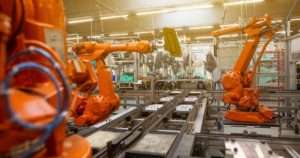An Intro to Automation and Inflation
Artificial Intelligence (AI) and Automation are transforming businesses and will contribute to massive economic growth via contributions to productivity. They will also address “moonshot” inflation challenges faced by businesses today.
Leveraging AI to automate tasks has had a significant impact across industries over the last decade, from generative AI in supply chains to self-driving vehicles, from halting speech recognition software to fully integrated video/audio concept recognition. AI and its related technologies have perhaps irrevocably changed the paradigm for businesses.
However, as the information revolution in the knowledge-driven economy continues, the impacts that it has on our economy are now reaching a point where most of the assumptions that economists have developed on how that economy works are being rewritten.
Understanding Inflation: Goods vs. Wages
Everyone has a somewhat skewed view of what inflation is. At its core, you actually have to talk about the inflation of what relative to what. From the consumer’s lens, inflation occurs when the cost of the same goods and services increases over time. This is good inflation, and there are several factors that contribute to it. From the employer’s lens, wage inflation occurs when the cost of hiring people is increasing for the same skill set.
Wage inflation leads to goods inflation because people are willing to pay higher prices for the same products. However, goods inflation is only marginally coupled to wage inflation.
Supply Chains, Demand, and Market Distortion
When supply chains are shrinking, production decreases, and demand drops, prices should drop. Most of the gains from profits and decreasing production costs have gone into stock markets and dividends, which account for the explosive growth in most of the major exchange indices.
AI and Robotic Automation as Deflationary Forces
AI technology is deflationary primarily because it allows the production of goods and services to scale efficiently. If the production of goods can scale efficiently enough to satisfy the market’s present and future demand for goods, the price of those goods should not increase even if demand increases.
As the adoption of AI and automation, including robotic process automation (RPA) and physical robotics on production lines, increases, the inflection point will be reached in more and more industries, and inflation will get weaker and weaker. We have more organizations leveraging AI & automation today than ever before, and the pace of technological innovation is increasing; therefore, deflation is more likely than inflation.
Certain industries will remain susceptible to short-term supply shocks and temporary inflation spikes, but long-term inflation across the general economy can be controlled with faster and wider adoption of AI & automation.
Fuel Growth, Not Burn Cash
Software as a service (SaaS) companies are a perfect example. The market has correctly identified that SaaS companies should generate high sales and earnings multiples in part because they can scale so efficiently and can add new customers virtually without burning through cash.
The global pandemic forced thousands of companies around the world to go remote with virtual offices in less than a month. This meant that the adoption of technology and embracing digitization led to fueling growth for SaaS solutions like Zoom at literally zero additional dollars spent on customer acquisition. The fast growth even led to small glitches and capacity issues, but Zoom was able to handle the increased demand for their product without needing to double or triple the price of their service. This is a great business model for Zoom and other teleconferencing companies, but it is also highly deflationary because the entirety of the market’s sudden demand for remote conferencing tools was met nearly overnight without the need for price increases.
The other factor that also enabled Zoom to scale serving customers was adopting a Conversational AI solution like Aisera. With over 5,000 monthly tickets and a rapidly growing customer base, Zoom sought to improve its current level of automation and self-service for employees. Zoom leverages Aisera’s AI Service Desk and Conversational AI virtual agent to provide its employees with unified self-service across company channels.
By equipping employees with intelligent self-service resolutions, Zoom quickly improved its auto-resolution rate, employee satisfaction, agent productivity, and MTTR. Through Aisera’s 24×7 virtual agent, Zoom continues to ensure top-tier employee satisfaction and proactive support solutions. Zoom improved employee satisfaction by 80% and dramatically reduced support costs.
The Evolution of AI: From Conversations to Autonomous Agents
AI and automation have come a long way—from the early days of Conversational AI, where virtual assistants answered basic queries, to the era of Generative AI, which introduced context-aware, human-like language generation across use cases.
This momentum gave rise to the AI Copilots, a powerful assistant embedded into workflows, helping employees write, analyze, troubleshoot, and make decisions faster. But the evolution doesn’t stop there.
Today, we’re entering the age of Agentic AI, a paradigm shift where AI Agents don’t just assist; they act autonomously on behalf of users, proactively completing tasks, making decisions, and orchestrating workflows across enterprise systems. These agents are context-aware, goal-driven, and continuously learning, fueling a new level of productivity and cost efficiency that’s inherently deflationary. This is not a future vision, it’s happening now.
To stay competitive, businesses must embrace this AI maturity curve. Those who move first will lead with speed, intelligence, and agility. Book a custom AI demo and see how Agentic AI can reshape your organization’s future, today!

